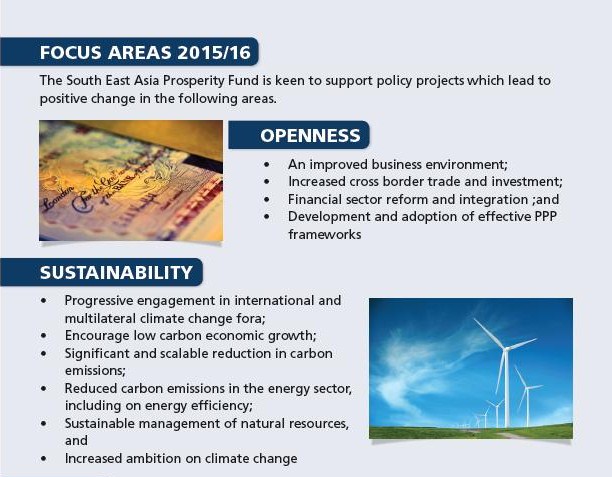29th June 2015 Bangkok, Thailand
4 Ways in which the UK is helping to grow Prosperity in Thailand
The Southeast Asia Prosperity Fund recently awarded one-year grants, to four projects in Thailand to implementing agencies that work in the area of improving transparency in Thai public procurement procedure and in business sector, assisting the Thai government to achieve ambitious goals on climate change, and enhancing energy security in Thailand. I will be blogging about these projects over the coming year and so for my first blog post I would like to give you a quick introduction to these four projects.

An Introduction to the Projects
The Thai government is currently drawing up legislations to increase transparency in the public procurement system. To ensure that the new Public Procurement Act will be effectively implemented, the United Nations Development Programme (UNDP) launched the ‘Enhancing Integrity and Openness in Public Procurement in Thailand’ project (as part of UNDP wider programme entitled Advancing Anti-Corruption Efforts in Thailand-a Multifaceted Approach (AAA)). Its objective is to provide recommendations by technical experts on the design of secondary legislations, institutional set up and capacity development strategy which would lead to a formation of public procurement law that operates under principle of value for money and high integrity.
To further reinforce the effort on transparency, the Thai Institute of Directors (IOD) received funding to deliver the ‘Ethnical Leadership Transformation Programme for Private Sector’s Collective Action against Corruption in Thailand’. It designs to encourage company directors, executives and middle managements to embed ethical dimension into their daily business practices. The training curriculum, developed by the Institute of Business Ethics (IBE), a British renowned institution specialized in transformation to high- standards business ethical practice, will include a day-to-day business dilemma in local context such as conflict of interest issues and how to speak up. It is expected that the trained participants will act as ‘Chief Ethics Officer’ and contribute to lifting private sector ethical standards in Thailand.
Energy security has been in the top list of Thai government’s agendas. Working closely with the Ministry of Energy and other local agencies, the International Energy Agency (IEA) will conduct the study of power mix in Thailand under the project ‘Enhancing Electricity Security in Thailand’. The overall objective is to provide recommendations on plausible scenarios to improve the supply and stability of the electricity sector across the country. It also intends to enhance Thailand electricity security with a focus on low carbon development and share best practices to neighbouring countries that have interconnections with Thailand. This project would not only contribute to Thailand energy security and sustainability but also potentially promote utilisation of the low carbon energy sources.
To complement the work on energy security and our activities on climate change, the project ‘Tool for Scenario Analysis of Integrated Thailand Energy and Climate Change Policies’ aiming to upgrade the existing Thai 2050 Pathways Calculator was established. Under this project, the implementer, GHGRA Co.Ltd., in close collaboration with government agencies such as Ministry of Energy, will integrate additional energy data to the current Calculator. The revised tool will provide a more in depth analysis on energy security, and will serve as the main model for analysing and setting targets for energy and climate change policies in the future. At the end, the tool will also be disseminated publically to raise awareness on energy and climate change issues in Thailand.
During the course of the year, I will bring you updates on these projects and the impacts the have made in Thailand. So be sure to bookmark our blog or sign up to our feeds to keep up to date with the latest developments.